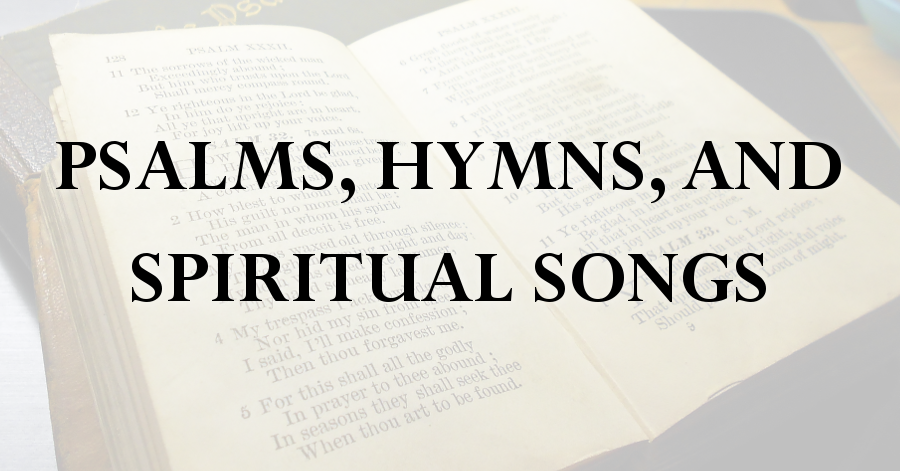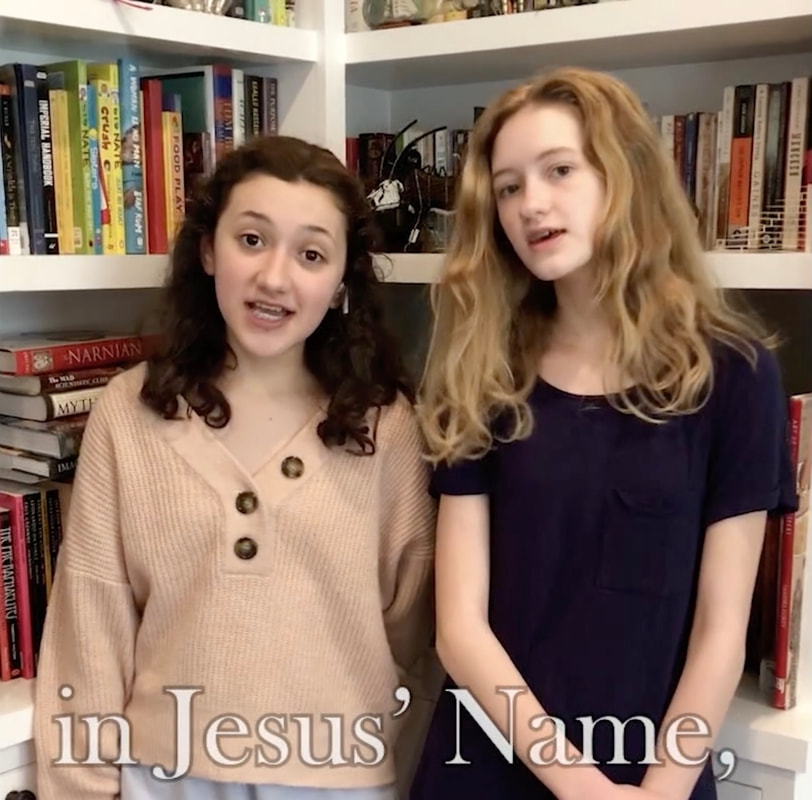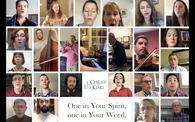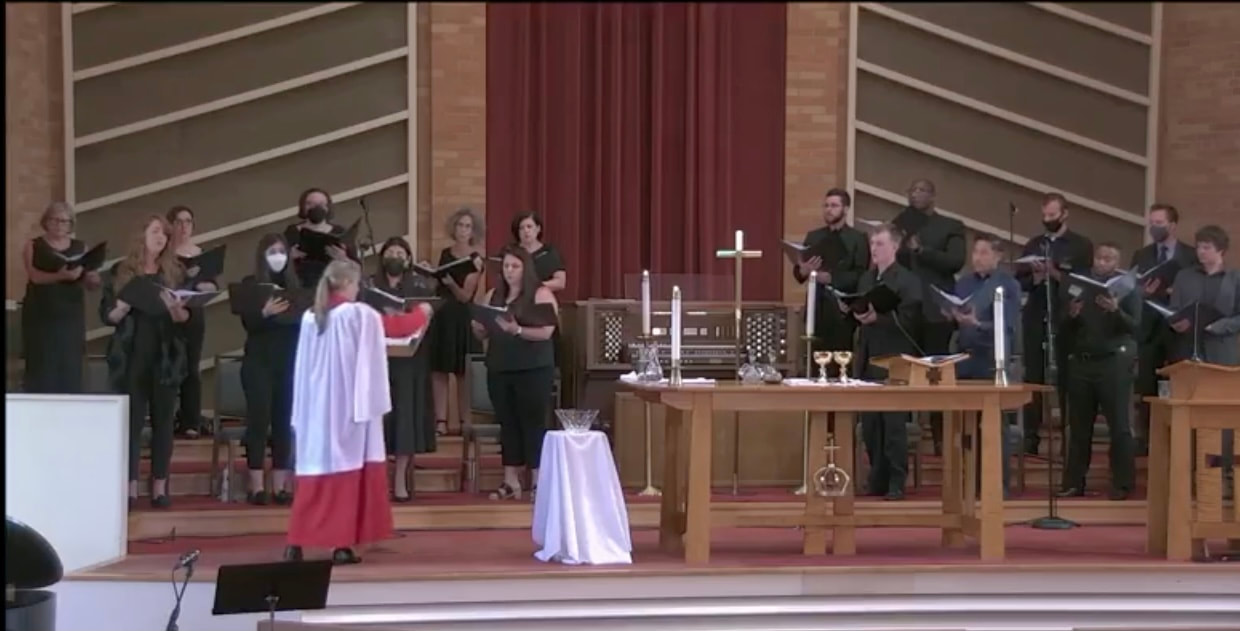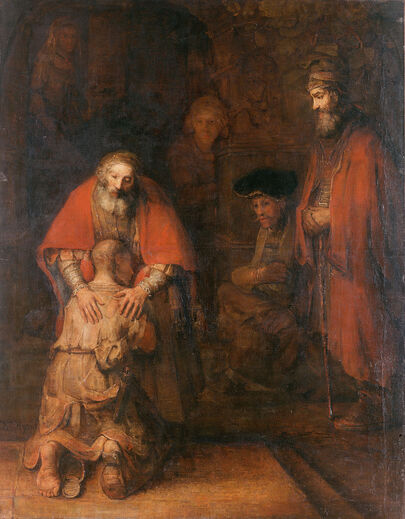|
Anytime we color outside the lines in worship at Christ the King, try something different, there is a ripple of reaction, a flickering of energy, if, for nothing else, the novelty of it. I decided to take this moment to share my commitment to what I for now will simply call "blended worship," and its theological basis. More than anywhere else, each of us has our own comfort zone in sacred music. It makes sense: if we are engaged in a Christian worship service, the music is there not only as a way to reinforce the concepts and doctrines of our faith; but it is a way for us to personally engage with our God and Savior. As David reminded us in his sermon on May 15, we are drawn to stories of a bigger, transcendent reality that is our true story--the one that matters. I would venture to say that any Christian who has taken part in Christian worship has had some poignant moments between themselves and the Lord while engaged with the music. These are the moments that reassure us of our place in the larger story of God's love, and they are truly sacred. These moments of being intentionally in God's presence, one with Him and one with His family, are the most precious we can experience in this life. We may weep; feel emboldened or strengthened; raise a hand in joy, or sing like no one is listening. Or we might become compelled to make a needed change, to turn back to God, and quietly live more faithfully for Him. It's the big stuff of life, and it's bigger than life. My thoughts have developed from experience with a wide range of worship styles. One year at CtK's fall retreat, our guest speaker, Scott Redd, described his church background as "denominationally promiscuous," which I found to be a humorous and familiar description. I am one of those as well: my family of origin chose churches and Christian schools for us based on which preached the Gospel most faithfully. At times, as our family grew from apartment to townhouse to single family home, that brought us to Baptist, Bible, Episcopal, Lutheran, and Presbyterian, churches. During my high school and college years, I had a few occasions to attend services, often weddings or funerals, at Assemblies of God, Catholic, Methodist, Moravian, nondenominational, and Pentecostal churches. I attended Young Life, which has its own implementation of sacred songs. My parents' backgrounds were in the Methodist and Salvationist churches prior to adulthood, so I am familiar with their hymnody and styles of worship as well. I have also attended services at a small startup church in a farming town in Costa Rica, a Russian Orthodox service in Moscow, and German Lutheran services in Pennsylvania and Washington, D.C. I personally attended Lutheran and Baptist private schools, and my daughter went to a conservative Christian school, all of which came with their own very distinct traditions. I do not bring this up to equalize or discuss the merits of any denomination, only to demonstrate that I have observed a vast array of worship styles, and this in addition to my post baccalaureate music studies, the history of which is grounded in church music; and speaking broadly, there are some longterm patterns that accompany them. I fell in love with Anglican worship as a young woman. The service was a little slice of heaven: excellent preaching, beautiful music, a palpable presence of the Holy Spirit, a diverse, kind, and warm congregation, and all set in a beautiful colonial church; I had found the right place for me. When I say diverse, I do mean diverse. The orientation toward missions and serving those in need brought souls that may otherwise not have felt welcome in the wealthy (and enormously generous) congregation. In one pew, you might see a homeless person and a famous Washingtonian. Young, old, healthy, hurting--they were all there. Some in the congregation genuflected and crossed themselves; many were alive in the revived charismatic movement, including the rector himself. They also engaged in a blend of worship styles: ancient/classical; The Hymnal 1982; and a supplemental book of praise songs. The Anglican service of Holy Eucharist remained firmly intact, but particular expressions changed from week to week, from season to season. And to be fair, it certainly was not a perfect place. There were some moments that went outside my comfort zone, complete with my own uncomfortable cringe and inner eye roll. Still, the community struck me as such a lovely portrait of the unity possible only through Christ. THE BIGGER PICTURE. In every membership class at CtK, David tells the joining members that "Anglicanism is not the only way, but it is a good way."* I share David's simple faith in the complete and atoning work of Christ, and faith in Him as our only Savior. This is all that is essential. --The Case for Structure. Music in worship is intrinsic to the Christian faith. We are exhorted, over and over through the entire Scripture to sing and make music to God. In scriptural accounts of worship, both directive and descriptive, the faithful sing psalms, hymns, and spiritual songs, play instruments, make a joyful noise, clap hands, bow, kneel, pray, feast or fast, maintain meaningful rituals, cry out for joy, raise holy hands, and even dance.** Following the life of Jesus on earth, church music maintained aspects of its ancient roots, and also adapted to its context. The "old" and the "new" have always coexisted harmoniously in Christianity: to deny the old is to deny the eternity of God; to deny the new is to deny His relevance to us today. Jewish settings of the Psalms provided the roots for the structure of the new eucharistic services, and new songs were sung to celebrate the fulfilled prophecies of The Messiah. Based on the Psalms alone, we can see that there was and is music for any season of life, from our most profound moments to our simple daily routines. The current fad view that, because the earliest Christians worshiped in homes, we should discard formal worship in favor of this for a "truer" model, misses the history lesson that in those services, gathered around a table, often in secret, they sang the Kyrie, Sanctus, and Agnus Dei. The meetings were serious, holy, and structured. The scriptural ubiquity of structured worship, and the dictum in 1 Cor. 14:40 that Christian worship be done "decently and in order" form the basis for my theological understanding of worship practices. Speaking practically, while the church calendar and lectionary were developed by sinful humans over many years, I contend that it is nevertheless a worthwhile structure. If you have ever read the daily lectionary, you will know that some of the most confusing and confounding passages in the Old Testament are paired with New Testament readings that show the role and purpose they played for the grand narrative of God's salvation plan. The schedule also ensures that no passages are overused, or conversely skipped to be more comfortable for us. There are liturgical times of feast and fasting, which, in addition to scriptural and historic precedent, we simply need as human beings to mark our time, and to intentionally remember God's providence. Without some structure, we fall back on personal taste. In the case of church music, that usually ends up reflecting the pastor's or the music director's strengths and personality. Referring back to the true essence of the faith, our need of salvation in Christ alone, I want to be clear that while the desire of a responsible church leader is to help us all realize this truth, any discussion of preaching, service, or music styles moves us out of the realm of absolute truth and into the realm of "best practices"--and best practices as employed by fallen, faulty, forgetful servants. Anything we do--even our personal devotion time--can be perverted by the enemy into a source of pride, or worse. Our feeble attempts at praise and service should not be confused with God's ultimate truth, or experienced as apart from His power. --The Case for Diversity and Novelty. So why blended worship, if the church calendar and lectionary encompass the teachings of the entire Bible? A good, solid structure serves us well--except when it doesn't. The temptation for an attendee at a clearly structured service is laziness. We check out. Blah, blah, blah, blah. Words, words, words. Oh, we're standing? Did I nod off? Please tell me I didn't snore. In light of the reality of God's story of love for us, and what it means to be engaged directly in worship of Him, that is about as low as we can stoop. In Revelation 3:16, God tells the church of Laodicea: I know your works: you are neither cold nor hot. Would that you were either hot or cold! So, because you are lukewarm, and neither hot nor cold, I will spit you out of my mouth. The first time I read that with any understanding, I remember thinking, "Yikes! Surely it's at least better to be an observant Christian, kind of doing the right things??" But any marriage counselor will affirm that disengagement is the sign of doom for a marriage. The Bible likens Christ to a bridegroom, and the Church to a bride. For the lukewarm believer (or marriage partner) there is no reason to fight. You simply don't care enough. Fighting, at least, shows that we have skin in the game, even if we are disillusioned at the moment. So the first theological imperative is that we keep our faith fresh; we intentionally remember those moments of ecstatic joy, not just the comfortable evenings on the couch. In our comfort, we forget that we were bought with a price. We forget how it feels to be without this love. Secondly, Christ's fulfilling of the Law broke down all barriers between Himself and believers, and provides power for us to break down the barriers between ourselves and others. We like our boundaries; they make us feel falsely secure and superior. "I may be this, but at least I'm not THAT." Referring back to the intimate seed of truth at the foundation of our faith: God's total knowledge of and love for each of us is the great equalizer. God is no respecter of persons (Acts 10:34). There is neither Jew nor Greek, there is neither slave nor free, there is neither male nor female, for all are one in Christ Jesus (Gal. 3:28). What divides us is insubstantial compared to what we share in Jesus Christ. We're equal in God's eyes, sure, but what's wrong with choosing music only from one's own tradition? Absolutely nothing. In fact, it's not only good, but it is important to have a steady diet of it, because your home church should serve to communicate and facilitate worship effectively, which is always best understood within our own cultures and comfort zones. However, a disproportionate focus on the traditions and musical canon of any tradition will lead to some doctrinal deficiency. While it is true that the lectionary and church calendar help ensure a complete distribution of Scripture throughout our years, we can ease into lukewarmness that results from familiarity and habit. The sacred music with which you engage is forming your own understanding of theology. What, for example, might happen if every single Sunday was bursting with ecstatic, charismatic (in either or both senses of the word) praise? Could normal life live up to the high? Where would you turn when you weren't "feeling it" or realized your life was not actually characterized by constant joy? Or what if every single Sunday, you sang only unaccompanied Psalm settings? Hard to go wrong, right, singing Scripture? But when some of life's sweetest and most intimate moments arose, would you be emotionally prepared to deal with true joy? Would you connect that blessing to God, or feel guilt and shame? What if you just sang songs or heard sacred music specific to your own tradition? You might forget that there is a whole world out there; centuries of believers who have come empty handed just like us to God, only to have our dirty rags traded for His perfect joy and love. Even more than those "out there," there are believers in other denominations who, for myriad and complex reasons like our own, have found a home in a different stylistic setting and tradition. Like the tribalism our overseas mission partner describes, the closer we are, the more hostile the boundaries. While holding fast to Christ alone and our faith in Him as our only Savior, I would suggest that some of our blessings can become distractions from Him. Those intimate worship moments might have manifested in a poignant musical moment; but those trappings can also become Satan's distractions. Sometimes, the experience itself becomes the object of worship, and we desperately try to recreate that moment. The Father of Lies can compel us to believe we seek the Lord when we really seek to feel great or experience catharsis. Paul loved his own people; in Romans, he writes that he would wish a curse on himself if it meant the salvation of his kinsmen. We can't change who we are, nor should we. Everything we have and are is a gift from God. Our traditions define much about who we are in this transient world. The value in keeping worship fresh and versatile, however, guards against traditionalism becoming its own orthodoxy. We begin to forget that we came for an encounter with Jesus, and lament the disruption of our habits. I would like to encourage you all to engage in the following exercises. As often as you like, choose a hymn or sacred song that you like, and study it. Is it doctrinally sound? Are there any parts you don't understand? What do you feel when that hymn is sung, and why do you think you feel that way? Does this hymn bring you to closer communion with or understanding of God? Then, anytime a piece of music in worship bothers you, analyze your response. Why? Is it because it messed up your expectation for the morning? Is it because you feel as though the tradition from which it is taken is "less than?" Is it because it makes you feel something too deeply? Is it because you fear that difference is a sign of the disintegration of the church? Is it because you think that kind of expression is disrespectful toward God? What do you think the writer of the song was thinking when s/he wrote it? Why do you think they felt compelled to write it down? It's good, healthy, and normal, to know yourself, to know what is for you, and what's not for you. I have my own comfort zone in church, church music, and other areas of my life. This is not to say that I'm one who should be upheld in any regard as an example, only that I know what I like and don't like, and generally have strong feelings that accompany this taste. I urge you, instead of allowing a surprise to take your focus off of God and worship of Him, to simply be at peace with identifying more or less closely with some kinds of musical worship. When it really rankles you, I urge you to consider why this may be. Thoughts? I would love to hear from you! As an individual, I can't possibly know all the inspired music being written for worship, and many of you have shared your own favorites which have quickly become mine as well. May God bless and keep you all! Ann *I personally recall finding this extremely refreshing after looking into some other churches and learning that to become a communicant member, I needed to stand, unified with my family, and promise to the church that I would uphold some very particular and fine points of doctrine that, while important, are simply not necessary for Christian faith and salvation. I similarly feel refreshed when our eucharistic celebrant at CtK reminds us that we come to the Lord's table, and not the table of any particular church. I remember the mortification of going forward for a blessing at a Roman Catholic service to which I was invited, and the priest dismissed me--and it happened on television, I might add. Why do we ask of one another more than God asks of us? **I'll note that King David's wife, Michal, thought his dancing was embarrassing, and on seeing it, despised her husband; to which David replied, "I will celebrate before the Lord" (2 Sam. 6:21); and God called David a "man after his own heart" (1 Sam. 13:14).
0 Comments
I've been meaning to write this post since last spring, when we embarked on our first ever virtual choir project. After yesterday's return to in-person choir after two years, I decided that it was time to revisit these thoughts. We have endured a lot of isolation and separation over many months due to the global pandemic. Prior to that, we had to downsize the music ministry plans in order to fit into our rented facility following the electrical fire at CtK. There simply wasn't room there for choir or instruments. When everything shut down last March, I recall having the thought, "Well, I hope I can keep my salary, as music will clearly be impossible." Here's a shout out to our fearless leader, David Glade, who encouraged the staff to think creatively about what we might do that we would not ordinarily be able to do. Make lemonade out of lemons, in other words. Prerecording service music was an adequate placeholder for awhile. As the quarantine drew on and on, I felt internal pressure to give the virtual choir thing a try. The choir at CtK is the most fabulous group of people. I was blown away when they were all game to give the virtual choir a try! It meant learning music alone, then playing the part and accompaniment in an earbud, while recording oneself singing a cappella on a different device. Framing, clothing (e.g., not the pajama uniform many of us sported in those days), and lighting in the room were all important. They needed to find time clear of ambient noise (extra credit for parents of small children!). Then, they'd send it to me, and off to production. There was a little healthy anxiety about getting all the details right, and obviously, recording one's solo voice. The voice is such an exposed instrument: if you're tired, or ate or drank something acidic or viscous, or have allergies--any number of things--it shows up in your voice. We all shared some nervous chatter and good-natured self-deprecation over the awkwardness of it all. I only listened long enough to make sure the audio worked before passing the files off to be combined, so there was no hairsplitting over individual tracks. When one sings with others, vocal idiosyncrasies blend together, smoothing the sound. When I finally started hearing and seeing drafts of the virtual choir, I was just stunned by how lovely it all sounded. From some of the humorously self-deprecating remarks I heard, you'd think the result would sound like a barnyard. Instead, I just thought wow--we really just sound better together. The CtK choir and friends sang A Song of Peace and Unity by Ann Lee on May 17, 2020. For the video, please see the homepage. Yesterday, September 19, 2021, choir sang together in person with the congregation of CtK for our 9 a.m. worship service. It was exhilarating to hear so many strong voices raised. As amazing as it was to be able to put complex music together remotely--(kudos to Charlie Calotta and Greg Hammond and their endless patience and tech support, and with whom music at CtK would have utterly failed in 2020)--I often felt the frustration of just not being totally in sync. Don't get me wrong: classically-trained musicians practice, and practice, and practice the art of ensemble, or being in sync. It doesn't just happen by virtue of being together. The effort is to make one cohesive musical moment, free from the individuality of one marching by the beat of his own drum. There is a kind of breathless magic that happens when an ensemble of any size is in that full flow zone. Two or more people create something larger than either could do individually; it takes on an identity of its own. Being physically apart makes achieving this elusive ensemble zone exceedingly difficult, and I would say impossible. Even with singers and instrumentalists with whom I've worked many times, and can anticipate stylistic choices and nuances, not being able to see each other, or to feel the physical resonance of one another, or to breathe together, meant that while we can simulate a high quality mash-up, that last piece of unique magic that occurs only from in-person harmony remained out of reach. Breath is the original conduit life force for human life (Gen. 2:7). We are physical bodies, we are dust (see also Ps. 103:14); but life enters and departs with breath. Many eastern religions and other practices and traditions have made a great deal out of the power of breath, even extending to idolatry. Professionals in health and neuroscience are finding clinical support for the value and power of controlling one's breath. Breath indeed carries our vitality, but it also carries germs. When stakes are high, and stress is high, what should we do with this frustrating dilemma? I think there is Biblical basis for both the exhilarating joy of lifting our voices together; when "everything that has breath praise[s] the LORD" (Ps. 150:6). Equally though, our dust-based bodies are vulnerable, as is all of creation, to the effects of sin. I think the takeaway is that we are simply not in heaven yet. Many of you have heard me tell my story of learning about heaven at a young age. I had always heard that heaven is perfect, and we will live in perfect joy with God. Perfection to me, at that age, 4 or 5, meant in addition to bouncing on clouds without fear of falling, that there would be talking pegasus ponies that you could hug and ride whenever you wanted. No parental permission necessary. One Sunday, a passage or part of a hymn stood out to me; from Rev. 4:8b says that the creatures never stop praising day and night; and "there forever glorified" is a hymn phrase that comes to mind. It was something like that. I asked my mother to please explain. She said all we'll want to do is praise God forever. "No," I thought, "that's not right. Heaven is perfect, and while I like singing just fine, a perfect world is as-described above. With ice cream." It has been easy to focus on the frustrating physical restrictions these days. I think what we forget is that we isolate and separate ourselves, allowing preferences, personalities, any sinful excuse to deny the unity that is the ultimate reality in Christ Jesus. We've missed the visceral feeling of being unified, when everyone lifts their voices in glorious praise together. And that is a taste of heaven. I pray that we will hold fast to sound doctrine (2 Tim. 1:13), however we may feel, and whatever challenges arise. We are one in the Spirit, and we share the adopted identity as God's children with all other believers and the whole communion of saints. This identity is static; no one can pluck us from His hands (John 10:28), whether we feel it at the moment or not. Still, I am one happy camper to engage in the incredible gift and immeasurable joy of joining with all of you in live music with thanksgiving. May Jesus Christ be praised! Christ the King Choir singing Prayer by René Clausen, and with the congregation at CtK on September 19, 2022, after a nearly 2 year hiatus.
 Look, God, look in the vastness of your dark hear this song in the chorus of the world where I sing for the glory of your coming held by love as the music pours from me a flame within as the night falls around me hear my prayer and come through the darkness hold me waiting as you wait to be born. "Advent Song." Words by Christine McIntosh, © 2005. Music by John McIntosh, © 2005. Chamber Choir: Judy Chirino Yannini, Michele Currenti, Charles Calotta, and Jesse Neace. Used with permission. This past Sunday, we held two services of Lessons and Carols, albeit with differences that mark this year of global pandemic. We've opened a conversation among our worship leaders and clergy about service pacing. There are times, like Palm Sunday, when Christ's triumphal entry into Jerusalem just begs to joyfully dance forward--All glory, laud, and honor to Thee, Redeemer King!--and Easter Sunday, most of all--Jesus Christ is risen today, alleluia! If you attended or watched the second service this past Sunday, you know we miscalculated the effect of social distancing, masking and unmasking on the overall service time. Unfortunately, with the continuing spread of illness, we need to keep services confined to a set time in order to sustain a safe worship environment. We cut a few song verses and stepped up the pace! And it was a success, insofar as no content was lost (unlike the first service--first service attenders, listen to David's inspiring words from the 11 o'clock service here); and we maintained safe worship time for all. I was not a fan of skipping along through Lessons and Carols though. Advent, a time of waiting and preparation felt hurried and frantic to me. (And under the circumstances, it is wonderful we didn't have to make more concessions--we are all very thankful to have maintained the content of the service at least that time). There's a lot of teaching and literature among churches this time of year about God's choice to enter mankind as a tiny baby. Themes usually center around His great humility. Christ, "rich beyond all splendor, all for love's sake became poor; thrones for a manger, did surrender, sapphire-paved courts for stable floor." There is nothing more vulnerable and helpless than a newborn baby; the irony of the omnipotent Lord of the Universe taking that form is a mystery. There is also a lot of teaching on and singing about adoration. The shepherds and the Magi adored him, they "fell down and worshiped him" (Matthew 2:11). We are to join them in adoration. What exactly does this mean? In colloquial usage, "adore" is usually somewhat flippant ("I adore pecan pie"). Does it simply mean to go to church and sing songs? Not a bad start. We should keep all of God's attributes in our hearts all year, and worship and obey Him accordingly. When we use the liturgical calendar, we especially focus on some specific attributes and works. On Palm Sunday, for example, we welcome Christ, we "fling wide the portals of our hearts;" on Easter, we glorify Him, celebrating the victory of death and all that entails for us; in Advent and Christmas, we meditate on Christ's coming, and we adore Him. In my mind, these factors relate to how we pace worship during this season. You cannot hurry waiting. You cannot hurry gestation. You cannot hurry a baby, and you cannot hurry his care. And you can't hurry adoration. I think part of the reason Christ came as a vulnerable, humble, baby is that it forces us to take the time to adore Him rightly. Not in a utilitarian way; in a way that shows the utmost deference, love, veneration, desire for closeness. I remember holding my daughter for the first time immediately after she was born. I was fortunate to hold my first grandson in the hospital shortly after he was born as well. You do not forget those moments. You are just lost in their perfectly precious little faces, all pink and round, warm and soft. The hats! the fingers! the toes!--so tiny! You hold and cuddle and caress in the gentlest and most committed of ways. You have to be all in or it could quite easily result in immediate death of the child. Their little partially formed heads are so fragile, but you can't help caressing them and kissing them, ever so gently. Whether these associations are what God intended, or have any exegetical merit, I don't know. I do know it helps me understand waiting, adoring, Christ's descent to earth as a tiny baby, and how this informs our adoration of Him. After preparing with care and anticipation, just like an expectant mother, finally the Christmas moment comes, and it is the greatest joy and love imaginable. One benefit of this amazingly challenging time is that many composers and arrangers are creating solo versions of favorite choral works. I was absolutely elated to find that Morten Lauridsen's ethereally gorgeous setting of O Magnum Mysterium--O great mystery--had been set for solo voice. A recording from the service is below. I think it is a perfect musical manifestation of adoration, with its gentle, loving flow; pregnant pauses; time to enjoy resonances; complex harmonies that underscore the great mystery; a high point that gushes elated worship; a prayerful, holy, conclusion. We're waiting right now for the world to "go back to normal," if that is even a thing. Luci Shaw, in her essay for the Third Sunday of Advent, writes: Though the protracted waiting time is often the place of distress, even disillusionment, we are counseled in the book of James to "let endurance have its full effect, so that you may be mature and complete." Pain, grief, consternation, even despair, need not diminish us. They can augment us by adding to the breadth and depth of our experience, by enriching our spectrum of light and darkness, by keeping us from impulsively jumping into action before the time is ripe, before "the fullness of time." I wait for the Lord, my soul waits, and in his word I hope. May God bless you as you wait, and as you adore Him fully. Cairns, S., et al. God With Us: Rediscovering the Meaning of Christmas. Paraclete Press, Brewster, MA. ©2007. "Thou Who Wast Rich Beyond All Splendor." Text by Frank Houghton (1894-1972) and Marilyn Baker. O Magnum Mysterium.
|
Ann leeDirector of Music and Worship, Christ the King Church Parish Archives
May 2022
Categories |
- Home
- GET INVOLVED
- CONCERTS & EVENTS
- Newsletters
- Music Notes with Ann
- Worship Moments for Your Week
-
Worship Music
- Special Music: Handel's Messiah, Part 1
- Special Music: Church Consecration
- Special Music: Encouragement for the Journey
- Prayer and Praise to God
- Advent
- Christmas
- Epiphany
- Lent
- Palm Sunday
- Maundy Thursday
- Good Friday
- Easter
- Ascension
- Pentecost
- Trinity Sunday
- For Our Nation
- All Saints Day
- Holy Eucharist
- Benediction
- Contact
Friends of Music at Christ the King © 2021

 RSS Feed
RSS Feed
